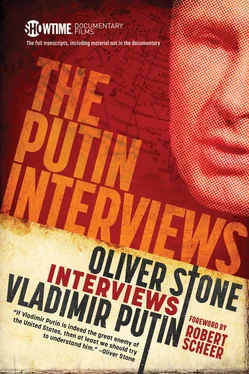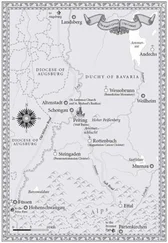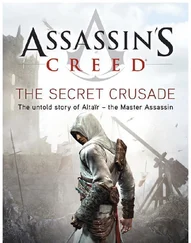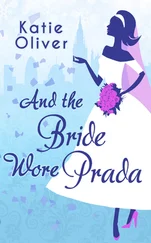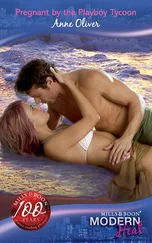OS:Okay, well we’re in 2000 now. This is a dark time. Now you’ve become president. The vote was 53 percent. You’re not expected to last. You’re president of a country which is in a dark time—the Chechen War is going on. It looks very bad and the oligarchs… Privatization is everywhere. You push back. I’ve seen the documentaries and I can show the footage of that fight. There was the greatest struggle it seems to me—one of the darkest times of your life.
VP:Yes, that’s… exactly the case. But those difficult times came not in 2000 but much earlier. I think it was in the early 1990s, right after the collapse of the Soviet Union, and by 2000… In 1998, we had a crisis—a very large economic crisis. In 1999, the second Chechen War was resumed and I became acting president and the country was in a very difficult situation. And that’s the truth.
OS:And did you wake up at four in the morning? Did you ever sleep? What were the dark nights like?
VP:No, I never woke up at 4 a.m. I went to sleep at midnight and I woke up at seven or so. I always slept for six to seven hours.
OS:Very disciplined. No nightmares?
VP:No.
OS:Really? This is a discipline from the military, from the KGB experience?
VP:I think that’s thanks to sport and to military service as well.
OS:You have a lot of discipline, sir.
VP:The thing is, if it’s not done then it’s really difficult to work. If you’re not disciplined then you will not have enough strength to address the current issues. Let alone strategic ones. You always have to keep fit.
OS:Yeah, but did you see your children during this period? And your wife?
VP:Yes, certainly. But only for a very short time.
OS:Regular basis? You’d have dinner at home or did you have dinner with them? Did you see them on a nightly basis?
VP:I came home very late and I went off to work very early. Well, of course I saw them but very briefly.
OS:And when did your parents die? In this period?
VP:My mother died in 1998 and my father in 1999.
OS:That must have been very difficult—among all these other difficulties.
VP:For the last two years my parents were in a hospital. And every Friday, I flew from Moscow to St. Petersburg to see them. Every week.
OS:And for the weekend, and come back on Sunday, or…?
VP:No, I went just for one day. I saw them, and then I came back to Moscow.
OS:Were they proud of you?
VP:Yes.
OS:Your mother and father couldn’t believe it, right?
VP:That’s indeed so. My father didn’t live two months to see me appointed as prime minister. But even before I became prime minister, when I saw him, when I came to see him, he always told the nurses, “Look—here’s my president coming.”
OS:That’s nice. That’s nice. You’re credited with doing many fine things in your first term. Privatization was stopped. You built up industries—electronics, engineering, petrochemical, agriculture, and many others. A real son of Russia—you should be proud. You raised the GDP, you raised incomes, you reformed the army, you resolved the Chechen War. [10] Claim: “You’re credited with doing many fine things in your first term. Privatization was stopped. You built up industries—electronics, engineering, petrochemical, agriculture, and many others. A real son of Russia—you should be proud. You raised the GDP, you raised incomes, you reformed the army, you resolved the Chechen war.” Supporting: According to London’s Guardian newspaper, Putin is favorably remembered by the Russian people for helping to “usher in an era of unprecedented prosperity… with real disposable income doubling between 1999 and 2006,” and with the GDP growing by a multiple of 2.7 from 2006 to 2014. “15 years of Vladimir Putin, 15 ways he has changed Russia and the World,” Alec Luhn (May 6, 2015). Retrieved at: https://www.theguardian.com/world/2015/may/06/vladimir-putin-15-ways-he-changed-russia-world
VP:Well, it’s not exactly like that. I didn’t stop privatization. I just wanted to make it more equitable, more fair. I did everything so that state property was not sold for free. We put an end to some schemes—manipulation schemes—which led to the creation of oligarchs. These schemes that allowed some people to become billionaires in the blink of an eye. With all due respect to Wassily Leontief, the American of Russian origin and Nobel Prize winner in economics. And when he was alive I met him and I attended his lectures and I listened to him talk. He said that property could be distributed freely for one ruble. But in the end, this property was supposed to get into the hands of people who deserved it—that’s what he thought. I think that in our conditions, in the Russian conditions, it led to the legal enrichment of a whole category of people. And it also led to a situation where the government either lost control of strategic industries or just led to the destruction of those industries. So my goal was not to stop privatization, but to make it more systemic, more equitable.
OS:I saw the footage of you with the oligarchs in 2003-4. It was an interesting meeting. But did you have head-on collisions with Berezovsky and people like that, with Khodorkovsky.
VP:No head-on collisions. I just told them that they had to be equidistant from the government. That was the fashionable term back then. And I told them that if they acquired their property within the framework of law, then we would not seek to take that property from them. But today laws are changing and they have to conform to the new laws. I assume that any attempts at revisiting the outcome of privatization can do more damage to the economy of the country than the privatization itself. And that’s why we’re going to continue with the privatization on a fairer basis and do everything in our power to secure these properties, these titles, but everyone has to understand that everyone has to be equal before the law. And no one objected back then.
OS:You cut the poverty rate by two-thirds?
VP:That’s correct.
OS:Respect for the old people. Pensions.
VP:Yes, many fold.
OS:In 2000, 2,700 rubles was the average income. In 2012, 29,000 rubles.
VP:Yes, that’s correct.
OS:Immensely popular in 2004—you’re reelected with 70 percent of the vote. [11] Claim: “Immensely popular in 2004—you’re reelected with 70 percent of the vote.” Supporting: Oliver Stone is correct that Putin won the 2004 Presidential election with about 70% of the popular vote. See, “Russia in 2004,” Elizabeth Teague, Encyclopedia Britannica . Retrieved at: https://www.britannica.com/place/Russia-Year-In-Review-2004
VP:A little more than that.
OS:And 2008, because only two terms are allowed, you would become the prime minister. A force behind the throne. And in 2012 you run for president and you win. By 63 percent, I believe 63 percent in 2012.
VP:Yes, that’s correct.
OS:So yes, three times president. Maybe, some people would say a fourth term like Roosevelt—you’ve outdone Franklin Delano Roosevelt.
VP:He was president four times? [12] Background Information: After first taking office in 1933 as America’s 32nd president, Franklin Delano Roosevelt, a Democrat, would eventually be elected to a record four terms in office. However, he was unable to fully complete his fourth term. Two years after his death, on March 21, 1947, Congress passed the 22nd Amendment to the US Constitution, stating that no person could be elected to the office of president more than twice. The amendment was ratified in 1951. See, “FDR nominated for unprecedented third term,” History , Retrieved at: http://www.history.com/this-day-in-history/fdr-nominated-for-unprecedented-third-term
Читать дальше
